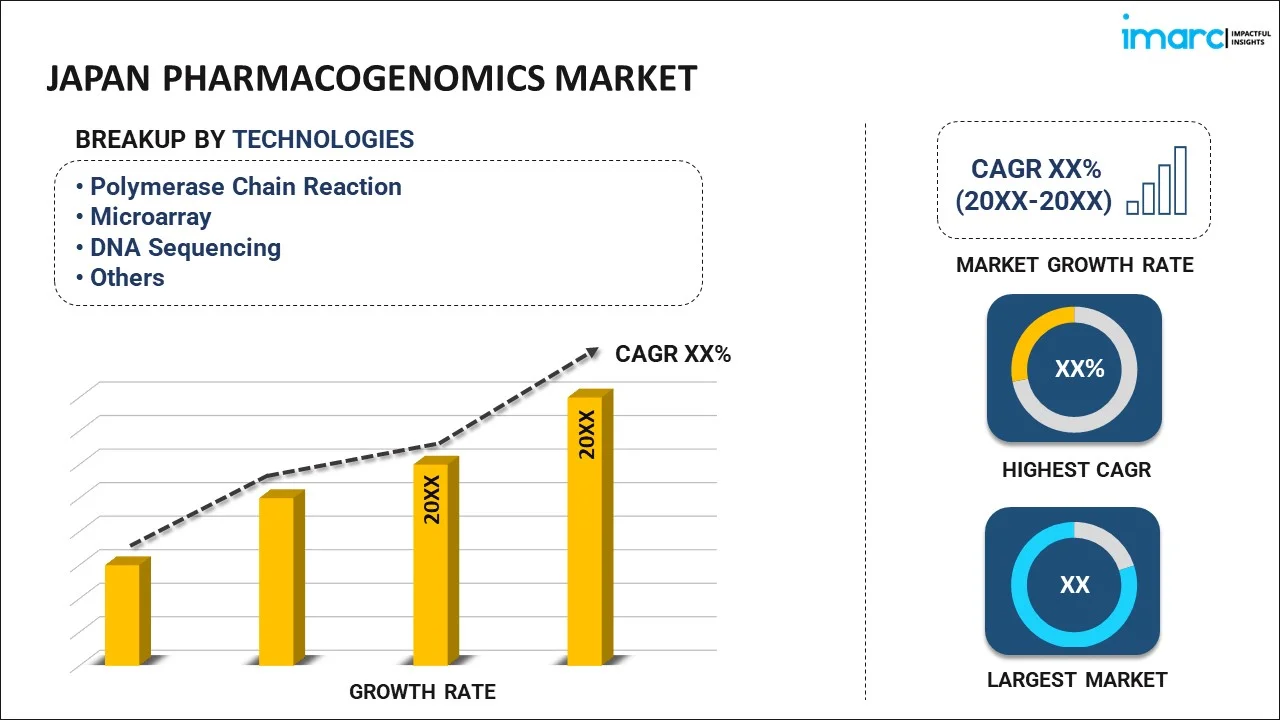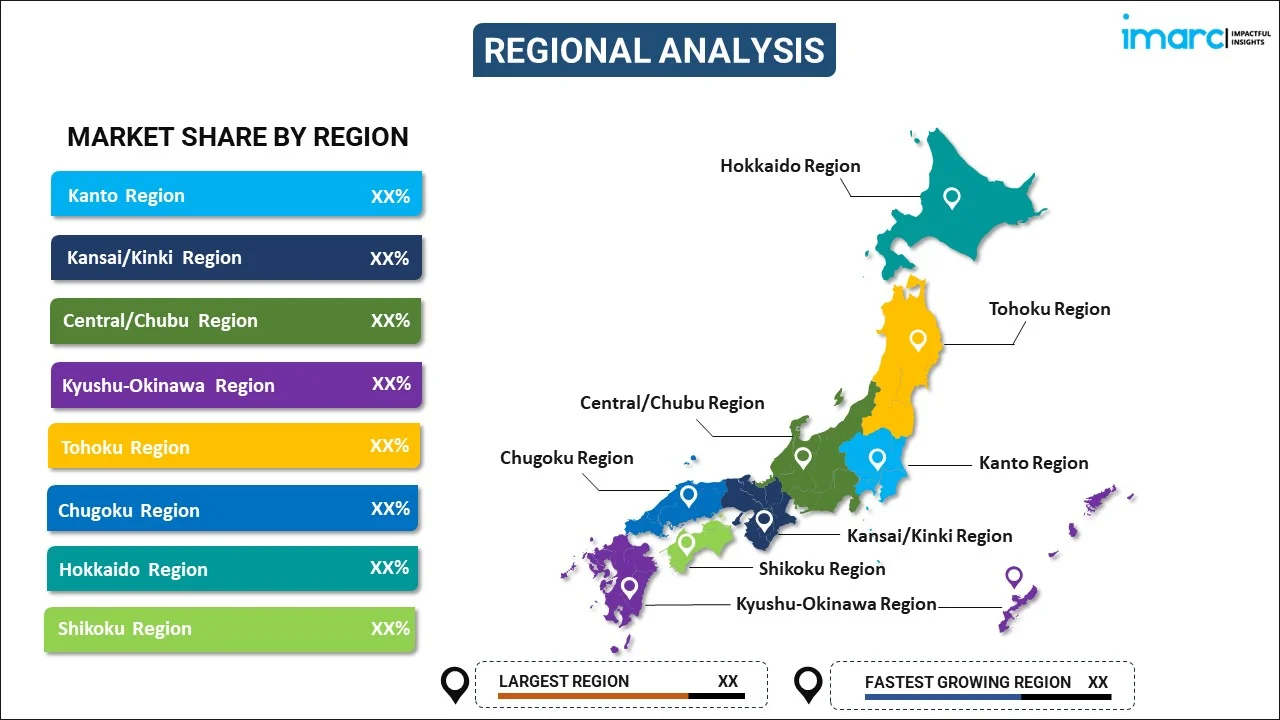
Japan Pharmacogenomics Market Report by Technology (Polymerase Chain Reaction, Microarray, DNA Sequencing, Mass Spectrometry, Electrophoresis, and Others), Application (Oncology, Infectious Diseases, Cardiovascular Diseases, Neurological Diseases, Psychiatry, Pain Management, and Others), End User (Hospitals and Clinics, Academic and Research Institutes), and Region 2026-2034
Market Overview:
Japan pharmacogenomics market size reached USD 401.5 Million in 2025. Looking forward, IMARC Group expects the market to reach USD 683.5 Million by 2034, exhibiting a growth rate (CAGR) of 6.09% during 2026-2034. The expanding healthcare infrastructure, increasing aging population, continual research, and development (R&D) activities by leading players, and rising educational initiatives by government bodies and healthcare organizations represent some of the key factors driving the market.
|
Report Attribute
|
Key Statistics
|
|---|---|
|
Base Year
|
2025 |
|
Forecast Years
|
2026-2034
|
|
Historical Years
|
2020-2025
|
| Market Size in 2025 | USD 401.5 Million |
| Market Forecast in 2034 | USD 683.5 Million |
| Market Growth Rate (2026-2034) | 6.09% |
Pharmacogenomics is the study of how genes influence an individual's response to medications. This scientific discipline combines elements of pharmacology, which is the science of drugs, and genomics, which is the study of genes and their functions. The primary aim of pharmacogenomics is to optimize drug therapy, maximizing effectiveness while minimizing adverse effects. Pharmacogenomics allows for a more personalized approach to medicine. It allows for tailored medical therapy based on an individual's genetic makeup. This means that treatments can be specifically designed to work best for each person, enhancing effectiveness. Personalized treatment can reduce the financial burden on the healthcare system. Fewer trials and errors in prescribing medication mean that patients can potentially reach an effective treatment faster, reducing hospital stays and lowering overall healthcare costs. Pharmacogenomics can also benefit pharmaceutical companies by identifying new drug targets and assisting in the development of medication that is more effective and safer, which can lead to faster regulatory approval.
Japan Pharmacogenomics Market Trends:
The country's robust healthcare infrastructure, characterized by cutting-edge technology and advanced research facilities, is driving the market in Japan. Japan's reputation as a leader in the field of technology and medicine facilitates a supportive environment for the growth of pharmacogenomics, with significant investments in research and development. Moreover, the strong government support for genomics research is supporting the market. Regulatory policies and funding are geared towards encouraging innovations in personalized medicine, including pharmacogenomics. The Japanese government has launched several initiatives to accelerate research in genomics and its application in medical treatments, thereby creating a favorable ecosystem for the pharmacogenomics market to flourish. The aging population in Japan also plays a critical role in augmenting the market. Older individuals are more likely to have complex healthcare needs and multiple medications, making them ideal candidates for personalized treatment plans. Pharmacogenomics can offer optimized drug therapies that are both effective and safe for this demographic, reducing adverse drug reactions, which are a leading cause of hospitalization among the elderly. In addition, Japan has a relatively high incidence of certain diseases that can benefit from pharmacogenomic applications, including various types of cancer and cardiovascular disorders. The ability to tailor treatments for these prevalent conditions can improve outcomes and reduce healthcare costs, making pharmacogenomics an attractive option for both healthcare providers and patients. Furthermore, the market is fueled by increasing public awareness about the benefits of personalized medicine. Besides, educational initiatives by government bodies and healthcare organizations have also contributed to a greater understanding of the advantages of pharmacogenomics, thus encouraging more people to opt for such tests and treatments.
Japan Pharmacogenomics Market Segmentation:
IMARC Group provides an analysis of the key trends in each segment of the market, along with forecasts at the country level for 2026-2034. Our report has categorized the market based on technology, application, and end user.
Technology Insights:

- Polymerase Chain Reaction
- Microarray
- DNA Sequencing
- Mass Spectrometry
- Electrophoresis
- Others
The report has provided a detailed breakup and analysis of the market based on the technology. This includes polymerase chain reaction, microarray, DNA sequencing, mass spectrometry, electrophoresis, and others.
Application Insights:
- Oncology
- Infectious Diseases
- Cardiovascular Diseases
- Neurological Diseases
- Psychiatry
- Pain Management
- Others
A detailed breakup and analysis of the market based on the application have also been provided in the report. This includes oncology, infectious diseases, cardiovascular diseases, neurological diseases, psychiatry, pain management, and others.
End User Insights:
- Hospitals and Clinics
- Academic and Research Institutes
The report has provided a detailed breakup and analysis of the market based on the end user. This includes hospitals and clinics and academic and research institutes.
Regional Insights:

- Kanto Region
- Kansai/Kinki Region
- Central/ Chubu Region
- Kyushu-Okinawa Region
- Tohoku Region
- Chugoku Region
- Hokkaido Region
- Shikoku Region
The report has also provided a comprehensive analysis of all the major regional markets, which include Kanto Region, Kansai/Kinki Region, Central/ Chubu Region, Kyushu-Okinawa Region, Tohoku Region, Chugoku Region, Hokkaido Region, and Shikoku Region.
Competitive Landscape:
The market research report has also provided a comprehensive analysis of the competitive landscape in the market. Competitive analysis such as market structure, key player positioning, top winning strategies, competitive dashboard, and company evaluation quadrant has been covered in the report. Also, detailed profiles of all major companies have been provided.
Japan Pharmacogenomics Market Report Coverage:
| Report Features | Details |
|---|---|
| Base Year of the Analysis | 2025 |
| Historical Period | 2020-2025 |
| Forecast Period | 2026-2034 |
| Units | Million USD |
| Scope of the Report | Exploration of Historical and Forecast Trends, Industry Catalysts and Challenges, Segment-Wise Historical and Predictive Market Assessment:
|
| Technologies Covered | Polymerase Chain Reaction, Microarray, DNA Sequencing, Mass Spectrometry, Electrophoresis, Others |
| Applications Covered | Oncology, Infectious Diseases, Cardiovascular Diseases, Neurological Diseases, Psychiatry, Pain Management, Others |
| End Users Covered | Hospitals and Clinics, Academic and Research Institutes |
| Regions Covered | Kanto Region, Kansai/Kinki Region, Central/ Chubu Region, Kyushu-Okinawa Region, Tohoku Region, Chugoku Region, Hokkaido Region, Shikoku Region |
| Customization Scope | 10% Free Customization |
| Post-Sale Analyst Support | 10-12 Weeks |
| Delivery Format | PDF and Excel through Email (We can also provide the editable version of the report in PPT/Word format on special request) |
Key Questions Answered in This Report:
- How has the Japan pharmacogenomics market performed so far and how will it perform in the coming years?
- What has been the impact of COVID-19 on the Japan pharmacogenomics market?
- What is the breakup of the Japan pharmacogenomics market on the basis of technology?
- What is the breakup of the Japan pharmacogenomics market on the basis of application?
- What is the breakup of the Japan pharmacogenomics market on the basis of end user?
- What are the various stages in the value chain of the Japan pharmacogenomics market?
- What are the key driving factors and challenges in the Japan pharmacogenomics?
- What is the structure of the Japan pharmacogenomics market and who are the key players?
- What is the degree of competition in the Japan pharmacogenomics market?
Key Benefits for Stakeholders:
- IMARC’s industry report offers a comprehensive quantitative analysis of various market segments, historical and current market trends, market forecasts, and dynamics of the Japan pharmacogenomics market from 2020-2034.
- The research report provides the latest information on the market drivers, challenges, and opportunities in the Japan pharmacogenomics market.
- Porter's five forces analysis assist stakeholders in assessing the impact of new entrants, competitive rivalry, supplier power, buyer power, and the threat of substitution. It helps stakeholders to analyze the level of competition within the Japan pharmacogenomics industry and its attractiveness.
- Competitive landscape allows stakeholders to understand their competitive environment and provides an insight into the current positions of key players in the market.
Need more help?
- Speak to our experienced analysts for insights on the current market scenarios.
- Include additional segments and countries to customize the report as per your requirement.
- Gain an unparalleled competitive advantage in your domain by understanding how to utilize the report and positively impacting your operations and revenue.
- For further assistance, please connect with our analysts.
 Request Customization
Request Customization
 Speak to an Analyst
Speak to an Analyst
 Request Brochure
Request Brochure
 Inquire Before Buying
Inquire Before Buying




.webp)




.webp)












